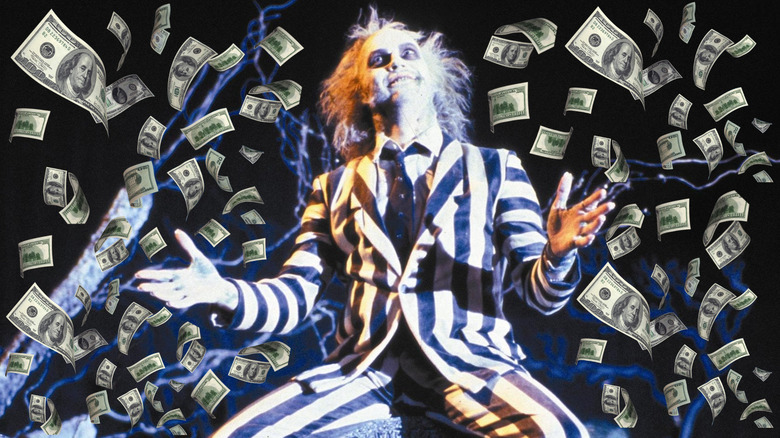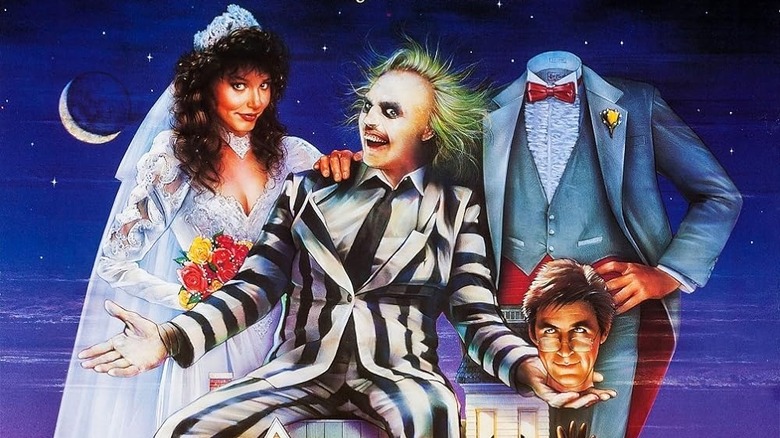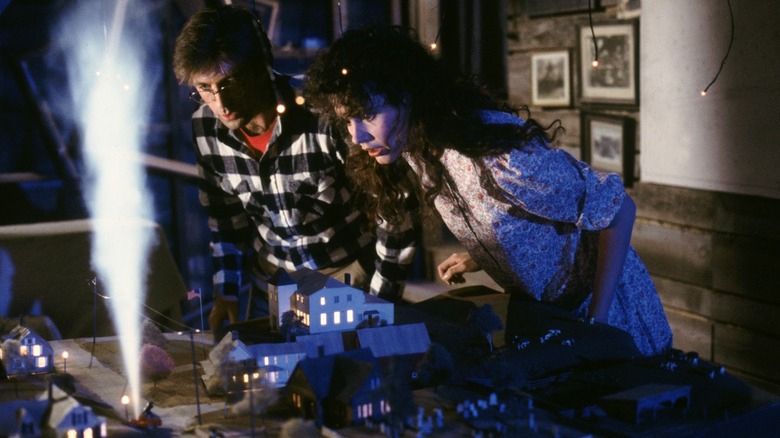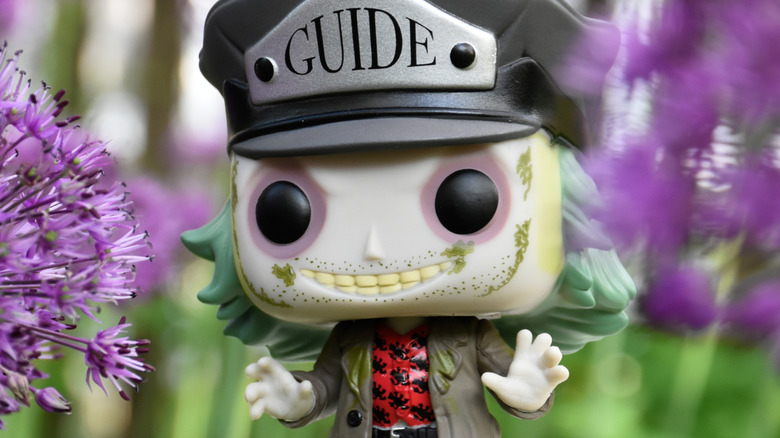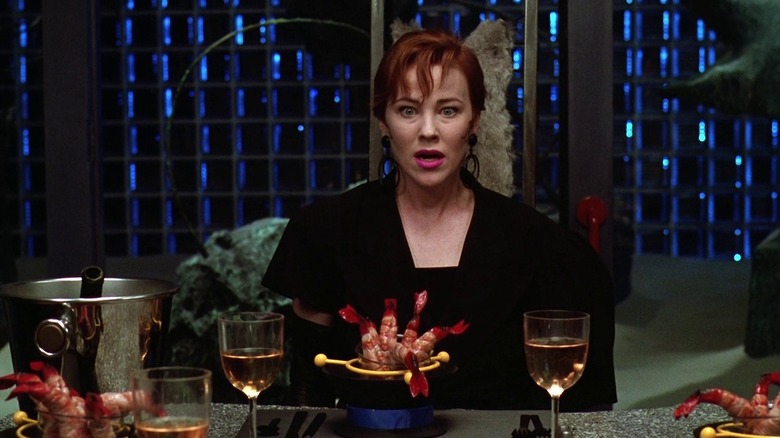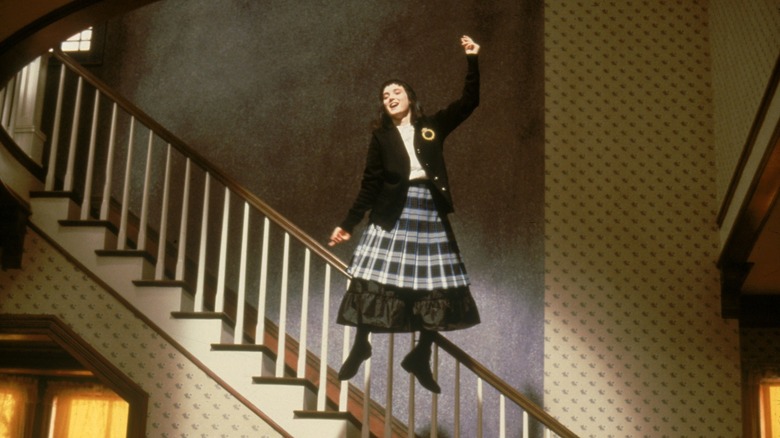36 Years Ago, Tim Burton Delivered The Box Office Hit That Defined His Career
(Welcome to Tales from the Box Office, our column that examines box office miracles, disasters, and everything in between, as well as what we can learn from them.)
Tim Burton is one of those directors that even the average person who has been alive on this planet for at least 20 years assuredly knows. He's got that Quentin Tarantino or Christopher Nolan level of recognition. He's in many ways a movie star unto himself, even though he's never really on screen. Yet, his distinctive, gothic-influenced, macabre, funhouse style is unmistakable. If someone calls a movie Burton-esque, it's hard not to get a good idea of what's in store. That Burton-esque quality fully revealed itself for the first time in 1988 when "Beetlejuice" hit theaters.
For as much as "Beetlejuice" has become a true classic of the late '80s, as well as arguably the defining hit of Burton's illustrious career, it wasn't exactly a movie that screamed success when it was being put together. Alec Baldwin was convinced it was going to be a career-killer for all involved. "I thought maybe all of our careers are gonna end with the release of this film, we're all gonna be dead," the actor said in a 2019 interview. "But when you're around Tim [Burton], he was just such a crazy professor," he added. That "crazy professor" quality, instead, resulted in something that resonated with audiences for more than three decades.
In Tales from the Box Office, in honor of the release of the long-awaited sequel "Beetlejuice Beetlejuice," we're looking back at the original '80s classic. We'll go over how it came to be, its anti-Spielberg nature, what happened when it hit theaters, what happened in the decades that followed, and what lessons we can learn from it all these years later. Let's dig in, shall we?
The movie: Beetlejuice
Written by Michael McDowell and Larry Wilson, "Beetlejuice" centers on a couple (Alec Baldwin and Geena Davis) who realize they are actually dead. After reckoning with their new reality, they try to haunt the pretentious new family who has moved into their beloved home. Desperate, they turn to a mysterious, demonic presence named Betelgeuse (Michael Keaton) for help. Unfortunately, once he's released, they quickly discover they can't control him. Chaos ensues.
Burton had asserted himself as a bankable director with his feature directorial debut "Pee-Wee's Big Adventure." It was certainly a success, taking in $41 million against a $7 million budget. As he was developing "Batman," other scripts were being sent his way. Nothing really resonated with him. However, he developed a relationship with McDowell and Wilson after directing an episode of "Alfred Hitchcock Presents" that they wrote. That helped build the bridge to "Beetlejuice."
Warren Skaaren ("Top Gun") did a rewrite on the script, which infused it with a lot more of the distinctive elements that Burton made the most of. So, what attracted Burton to the material? "A lot of people have ragged on the story of 'Beetlejuice,' but when I read it, I thought, 'Wow! This is sort of interesting. It's very random. It doesn't follow what I would consider the Spielberg story structure," Burton said in a 1988 interview shortly after the film's release. Tellingly, the filmmaker also said, "The things that interest me the most are the things that potentially won't work."
To that end, Burton apparently admitted to Geena Davis that he didn't fully get the movie, at least not as it existed on the page. In Davis' autobiography "Dying of Politeness: A Memoir," the actor behind Barbara Maitland explained that she was confident that she got the movie. That's a big reason why she got the part:
"I just want you to know, I get this movie, I really get it. [...] Later, he would tell me that one of the reasons he cast me was because he wasn't sure he really got the movie, so it might be handy to have someone around who was very sure they knew what it was about."
The trappings of Tim Burton came together for Beetlejuice
Casting, as it always is, was a ridiculously important part of the equation here. Originally, for the titular role, Burton had envisioned Rat Pack singer Sammy Davis Jr. That didn't pan out. Instead, Warner Bros. and the up-and-coming filmmaker turned to "Mr. Mom" star Michael Keaton, who was very much on the rise at that time. The rest of the ensemble was filled out with reliable character actors, including Catherine O'Hara ("After Hours"), Glenn Shadix ("Heathers"), and relative newcomer Winona Ryder. The chemistry between all of the actors proved to be the secret sauce.
Burton was given a sizable (at least by 1988 standards) $15 million budget to work with. Still, the filmmaker had a lot to accomplish with that money, from elaborate sets to stop-motion sequences, and a number of practical effects. Not to mention costumes, props, and everything else that gives the film that now-signature Burton charm. Not to get ahead of ourselves here, but "Beetlejuice" would go on to win the Oscar for Best Makeup.
Another key element was the soundtrack, which was composed by Burton's frequent collaborator Danny Elfman. The pair had worked together on "Pee-Wee" as well. Here, though, much of the sound that audiences would come to associate with the duo would come to fruition. Elfman's job was not easy though, as he ended up doing the score two times over. His first pass, which was based on the script, didn't match up with what came out of Burton's mind.
"As soon as I saw it, I was like, 'Oh, this is not the movie I was imagining in my head. This is something else completely,'" Elfman explained in a 2023 interview. "Michael Keaton brought this energy, and that's what I'm latching onto." It speaks volumes about what Burton brought to the material. Speaking further, Elfman helped sum up the energy that permeated the film, giving it that distinctive, chaotic quality we all know today:
"Tim just let me go crazy and run amok. And I was like, 'Great. If you're game, I'll just go nutty the whole time until you tell me to stop. Until you tell me that I've gone too far.' And he almost never told me that I've gone too far, fortunately, which is one of the reasons I love working with him."
The financial journey
Warner Bros. released "Beetlejuice" in theaters on April 1, 1988. Somehow, even today, releasing this particular film on April Fool's Day just feels right. The marketing was surprisingly faithful to what Burton had cooked up. The studio didn't try to get clever in selling this unique horror-comedy to the masses. The trailers leaned heavily on Keaton's title character, even though he doesn't actually have a ton of screen time in the final film. Understandably so, though, as that performance anchors the final product in a very meaningful way. It's one of those examples of an actor and director clicking into place perfectly.
It all worked out very well, as "Beetlejuice" opened atop the box office with $8 million, beating out newcomers such as "Bright Lights, Big City" and "The Seventh Sign." Rather remarkably, Burton's sophomore feature only opened on 1,000 screens, whereas most of the rest of the entries in the top 10 that weekend were playing on between 1,100 and 1,600 screens or more. That was just the beginning though; the film held onto the number one spot for three more weekends, only slipping to the number two spot on the weekend of April 29 when "Colors" took the top spot. That was also the same weekend that "Critters 2: The Main Course" opened.
For Warner Bros., it was a smash hit. The film finished its run with just shy of $75 million. Almost all of that money came from domestic ticket sales, as overseas box office wasn't always as much of a thing back then. At the very least, those figures weren't reported on as reliably. Rest assured though, WB found a way to capitalize on the film elsewhere in the world, not to mention through cable, home video, and merchandise. There was even a four-season "Beetlejuice" animated series that ran on ABC from 1989 to 1991.
This is a film that has had a very long shelf life. It profited in theaters, no doubt, but that was truly just the tip of the iceberg. More importantly, it made Burton Hollywood's next big thing. His breakthrough hit served as an excellent showcase of his unique talents, which allowed him to further flex those same muscles in the years that followed.
Tim Burton's dominant run in Hollywood begins
While he had been developing the film before taking on "Beetlejuice," it simply couldn't have worked out better that Burton's follow-up was 1989's "Batman," which ended up being one of the biggest box office hits in history up to that point. The film reunited him with Keaton, who played the DC Comics superhero. That was the point of no return for Burton, who was in Hollywood's good graces. Even though "Batman" was a franchise film, it was still filtered through his very specific POV. That was even more the case with 1992's "Batman Returns," which was not quite as big of a hit, although it has garnered a very passionate fanbase over the years.
Burton then went on a hugely impressive run that included films like "Edward Scissorhands," "Ed Wood," "Mars Attacks!," and "Sleepy Hollow." He ended the '90s with arguably one of the best string of hits any director could ever ask for. "Ed Wood" and "Mars Attacks!" weren't commercial successes in their day, but they've certainly made up for their shortcomings at the box office over time.
The 2000s were admittedly more of a mixed bag for the director, but what's interesting is that even some of his most-maligned films were still arguably hits. His largely panned 2001 remake of "Planet of the Apes" made $362 million against a $100 million budget. His live-action remake of "Alice in Wonderland" made $1 billion worldwide at a time when very, very few movies ever made it to $1 billion.
Along the way, he also delivered gems like "Big Fish" and "Corpse Bride." Those films weren't always hits theatrically, but Burton's works have a way of living well beyond their runs on the big screen. There's a reason he doesn't have a lot of trouble getting films financed even after misfires like "Miss Peregrine's Home for Peculiar Children." ($296 million worldwide/$110 million budget). Burton's name means something to audiences, and that's pretty rare. That all goes back to "Beetlejuice."
The lessons contained within
Hollywood has changed immeasurably since 1988, to say the very least of it. The business is far more franchise-obsessed now than it is focused on individual voices. Guys like Christopher Nolan are the rarest of rare exceptions. For the most part, there's a reason why a guy like Colin Trevorrow got to direct "Jurassic World," or why James Gunn got to take a crack at "Guardians of the Galaxy." They had only made small movies before that. The IP is what's valuable though. In those cases, the filmmakers proved that they had chops, but the movie isn't about their vision; they simply managed to get some of their vision inside of an IP sandbox. Visionary filmmakers aren't likely to play by the rules in those situations.
Burton, meanwhile, has felt the most constrained while working in franchise territory. His live-action remake of "Dumbo" is the prime example, with the filmmaker even referring to Disney as a "horrible big circus" afterward. Funny enough, it was also that experience, in combination with "Wednesday" on Netflix, that led him to finally make "Beetlejuice Beetlejuice" after decades of talking about it. As of this writing, it's early, but audiences seemed very excited and a big part of that is because the sequel looks like vintage Burton. That still feels special.
What stands out, in reflection, is how seemingly uncompromising a big studio like Warner Bros. allowed "Beetlejuice" to be in its day. Burton was a filmmaker with one hit under his belt. Yet, he got to make a weird, creepy carnival of a movie that represented his distinctive sensibilities as a filmmaker. It allowed him not to be put in a box that didn't suit him as an artist. Rather, it showed what he was capable of by being authentically himself.
Even down to marketing the movie honestly, it feels like a lightning-in-a-bottle moment — one that would be tough to come by in modern Hollywood. Unless a visionary can cobble together a tiny budget in the indie system, this sort of uncompromising originality is tough to find these days. Maybe we could stand for a little more of that. Not just because it's rewarding artistically, but because it can also be rewarding financially when it all comes together.
